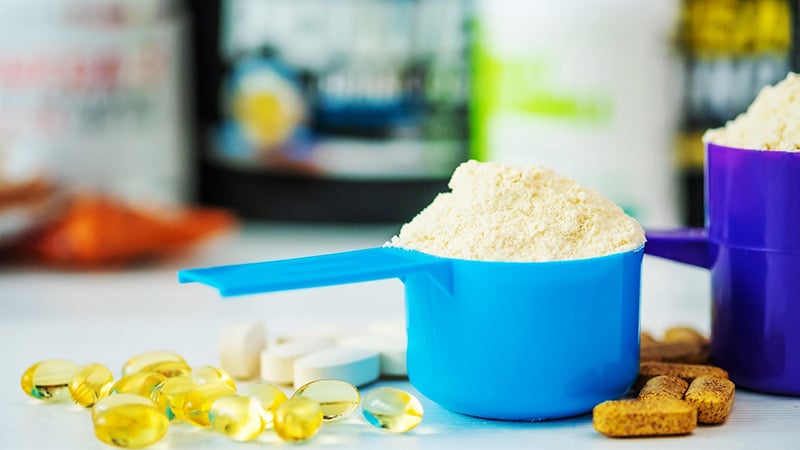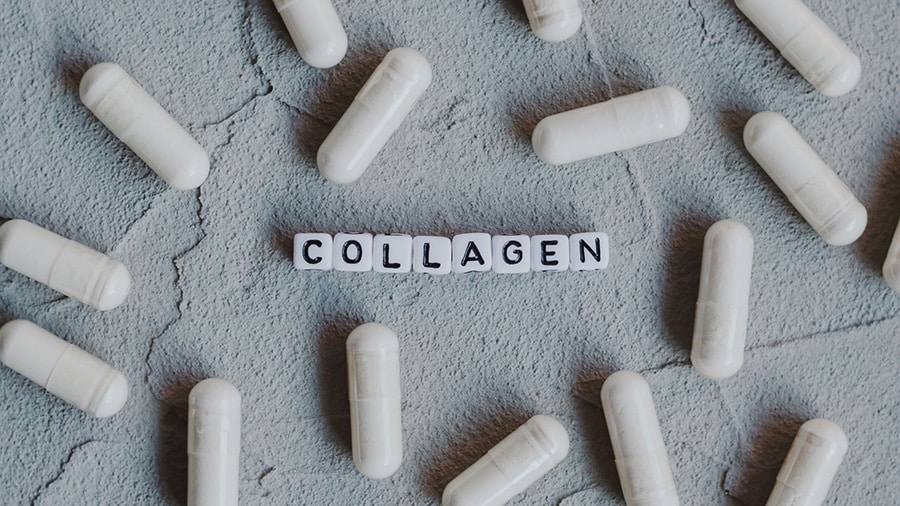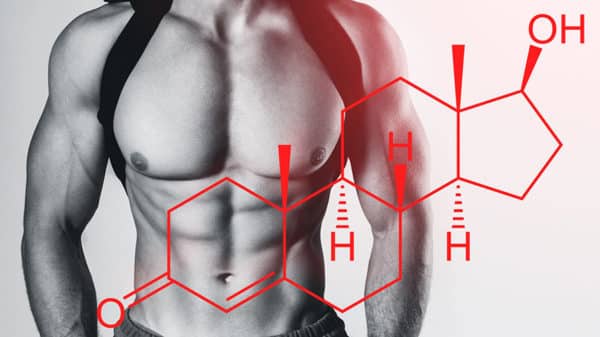The collagen is a protein widely present in the human body. It is a component widely used in cosmetics, particularly in the design of anti-wrinkle creams. But collagen has many other unknown virtues and can play an important role in the muscle development.
What is collagen?
Collagen alone represents nearly one third of the total amount of proteins present in the body. This macromolecule is the major component of connective tissuesIt is found in the skin, tendons, ligaments and muscles. It is also present in hair, nails or gums.
Collagen is rich in glycinea non-essential amino acid. In concrete terms, it is thanks to collagen that the skin maintains its elasticity. It is also involved in the maintenance of various elements: cartilage, bones, tendons, ligaments, etc.
In reality, there are 28 types of collagen. The 3 main ones represent almost 90 % of all the collagen present in our body:
- The type I collagen It is present in large quantities in the body and is involved in the formation of the skin, tendons and bones;
- The type II collagen It is located in the cartilage;
- The type III collagen It is located in the muscles and walls of the blood vessels (mainly veins and arteries).
Collagen formation occurs naturally through connective tissue cells. However, this secretion decreases with the aging. From the age of 25, collagen production decreases by about 1.5 % per year.
Different symptoms can be a sign of a lack of collagen :
- dry or wrinkled skin,
- dislocations or sprains,
- recurrent pain in the tendons,
- frequent muscle tears.
Unfortunately, our current eating habits do not allow us to make up for this loss. It is, in fact, very difficult to adopt a diet rich in collagenThis is because the foods containing this protein are not the most common: offal, chicken or fish skin, bone broth, etc. Overall, you will find this protein in connective tissue of animal or marine origin. It is true that we do not eat it every day.
To cope with this natural decline in collagen productionIt is therefore essential to consume food supplements.
What are the benefits of collagen?
Development of muscle mass
Rich in glycine, collagen promotes the increase of the muscle volume. This explains why many athletes use the collagen supplementation.
Several studies have highlighted the effects of collagen on the weight gain. One of them was conducted in 2015 by German researchers. The latter analyzed the performance of two groups of elderly people following a specific weight training program. In addition to the sports sessions, one of the two groups consumed 15 grams of collagen per day.
After 12 weeks, the collagen consuming group had gained 50 % more muscle. This can be explained by the fact that collagen is at the origin of the production of creatine in the body. This non-essential amino acid helps to stimulate theanabolism and therefore participates in muscle growth.
Fat loss
Collagen is also known to allow lose fat. According to the results of the study conducted by the German researchers, the group that consumed collagen also lost 50 % more fat than the group that consumed a placebo substance.
Collagen is therefore just as useful for people who want to make a dry.
Prevention of joint pain and injuries
Collagen is involved in maintaining the cartilage. Cartilage is essential because it plays a role in protecting our joints. When the cartilage loses its integrity, joint pain appears. This is the main cause ofosteoarthritisan inflammation of the joint tissues.
The amount of collagen produced by the body decreases over time, so taking supplements can help prevent and reduce this pain.
Also, aging is directly responsible for a loss of flexibility. The muscle tissue being less resistant, the risk of injuries such as muscle tears becomes more important. Here again, consuming collagen helps to prevent these injuries.
Improvement of bone density
As we have seen previously, the bones of the human body are largely composed of collagen. But the natural production of collagen decreases over the years.
As we age, our bones become more fragile, which increases the risk of fractures. This disease is known as osteoporosis. To counter this phenomenon, it is recommended to consume collagen in the form of food supplements.
Improved skin health
This is one of the most well-known virtues of collagen. Products containing collagen help to fight against skin aging and the appearance of wrinkles.appearance of wrinkles.
Collagen supplementation: which supplements to choose?
Bovine or marine collagen?
Two main types of collagen are generally proposed on the market of food supplements.
The first is produced from animal waste from the food industry (cows, chickens, pigs, etc.). The second one is produced from fish residues. It is the marine collagen.

Marine collagen has the advantage of being more easily assimilated by the body. It is therefore preferable to opt for this version, especially since its structure is virtually identical to that of collagen produced by the body, unlike animal collagen.
Most sports nutrition brands offer collagen in the form of food supplements. For my part, I consume daily collagen from Prozis. These collagen peptides are of high quality and are combined with vitamin C and magnesium. This makes their absorption even easier and also promotes the natural production of collagen in the body.
Unlike native collagen, which has low bioavailability, collagen peptides have a absorption rate of approximately 90 %. It is actually collagen hydrolysate, a result obtained by a chemical process of enzymatic hydrolysis.
How much collagen should I consume?
As for the dosage, it is recommended to take approximately 10 grams of collagen per day. These food supplements are often available in capsules or powder. It is up to you to choose the alternative that suits you best.
On the other hand, you should know that collagen contains almost no leucine. Leucine is the amino acid that builds muscle. It is therefore essential to consume enough of it to build muscle. If collagen contributes to meeting your daily protein needs, it must be supplemented by another source of protein (BCAAs for example).
Finally, it is important to note that collagen does not present no side effects known to date.
Conclusion
In summary, collagen is a substance that becomes more and more important with age. Its production by the body declines naturally with aging, so it is essential to supplement it to optimize the development of your muscles over the years.








